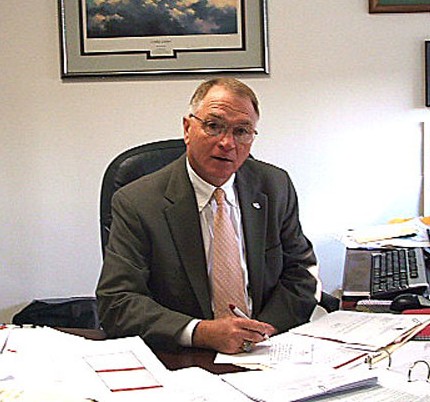
“The way we handle campus security has changed a lot since April 16, 2007,” said Thomas Turner, 58, Director of Campus Security at Roanoke College. “That, of course, was the date of the Tech massacre.”
Turner referred to the day that Seung-Hui Cho opened fire in Virginia Tech’s Norris Hall, slaying 30 victims and wounding 17, before shooting himself. Wrongful death lawsuits filed against Virginia Tech President Charles Steger and former Executive Vice President James Hyatt are still pending in the courts.
“Today we have emergency phones placed in strategic locations as well as campus-wide instant texting capacity through the Maroon Alert System, voice over internet protocol (IP) phones, and surveillance video cameras all over the campus,” said Turner. “But the recent evolution of campus security across the nation really stems back to the ‘Clery Act,’ a federal law that went into effect in 1992.”
Turner explained that the law was named in memory of Lehigh University freshman, Jeanne Ann Clery, who was raped and murdered in her residence hall bed in April of 1986.
Her parents found out that students had not been notified about a slew of violent crimes on the Lehigh campus in the three years prior to her murder. They joined with other campus crime victims and persuaded the U.S. Congress to enact this law, which was originally known as the “Crime Awareness and Campus Security Act of 1990.”
The law was amended in ’92 to add a requirement that schools give victims of campus sexual assault certain basic rights, and was amended again in ’98 to expand the reporting requirements. In 2000, the law was amended a third time in order to require notification of college and university campus communities about information regarding the whereabouts of registered sex offenders.
“After the Clery Act, colleges and universities had to publish annual security reports and crime logs, including incident reports to be made available to citizens, as well as “timely warnings.”
“The ‘timely warning’ alert requirement used to be somewhat subjective, but after the Tech massacre, the federal guidelines have become more clearly defined pertaining to emergencies or possible life-threatening situations,” Turner said. “For example, I had a natural gas leak a few weeks ago on the campus, so I immediately sent out a Maroon Alert.”
Turner has been working to keep the Roanoke College campus safe for the past 28 years. Prior to that, he was a Roanoke City police officer. But he doesn’t have much time to keep his head buried in security manuals because he also travels across the state as a volunteer lecturer on legal liability issues to help Virginia campus security officers earn their certification.
“I’m proud to work for the V.P. of Student Affairs and Dean of Students, Dr. Eugene Zdziarski,” said Turner. “He’s one of the best and most experienced professionals in the campus security business.”
And that’s important because, according to Turner, ever since 9/11 – the FBI has identified college campuses across the nation as “soft targets.”
“You figure, 90,000 people at a football game, in one place at one time,” Turner said. “Research universities may be especially vulnerable, so being more aware is important.”
“At Roanoke College we have a ‘Care Team’ that meets every Monday morning,” Turner said. “Our team includes the dean of students, campus law enforcement, health services, and other academic officials. If a student seems to be struggling with serious problems, we try to intervene. It’s hard to identify what you’ve deterred, but I think we have deescalated some situations.” The school encourages everyone on campus to make officials and staff aware of any personal or relationship problem that has the potential for violence, as well as anyone who might be in emotional distress, or who has threatened violence.
Turner said the number of problems related to alcohol on campus has remained virtually the same over the years, but he now has a growing concern about students who abuse prescription drugs; he worries about students who are mixing high energy drinks such as Red Bull with alcohol. “I’m not seeing cocaine, marijuana, or other illegal drugs on the grounds of the campus proper,” Turner said, adding – “We have a close working relationship with the Salem Police.”
Shortly after Campagna’s interview with Tom Turner, it was reported that there had been an assault on campus. Following is an update from Turner regarding the situation:
“A suspect in the assault on a Roanoke College student near campus Sept. 3 has been identified and apprehended. Early [last] Sunday morning the Office of Campus Safety received a call from an alert student regarding a suspicious person resembling a description given earlier. Campus Safety officers responded to the call, located the individual and detained him until Salem Police arrived for a follow-up investigation. We appreciate the help of the college community and the Salem Police Department during the investigation. A special thanks to the alert student for the timely reporting of a suspicious person and to the Campus Safety officers for their professional response and apprehension of this person.”
Turner added that the Roanoke College campus safety continues to work closely with the Salem Police Department to ensure the safety of all students.


